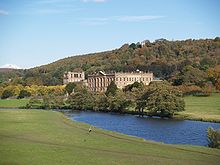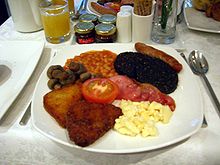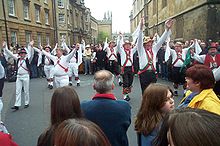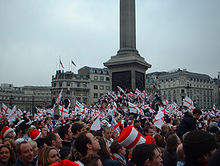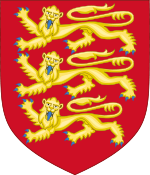- Culture of England
-
The culture of England refers to the idiosyncratic cultural norms of England and the English people. Because of England's dominant position within the United Kingdom in terms of population, English culture is often difficult to differentiate from the culture of the United Kingdom as a whole. However, there are some cultural practices that are associated specifically with England.[who?][citation needed]
Contents
Architecture and gardens
Main article: Architecture of EnglandSee also: List of historic houses in England, List of English Heritage properties, and List of National Trust properties in EnglandEnglish architecture begins with the architecture of the Anglo-Saxons; at least fifty surviving English churches are of Anglo-Saxon origin, although in some cases the Anglo-Saxon part is small and much-altered. All except one timber church are built of stone or brick, and in some cases show evidence of reused Roman work. The architectural character of Anglo-Saxon ecclesiastical buildings ranges from Coptic-influenced architecture in the early period; Early Christian basilica influenced architecture; to, in the later Anglo-Saxon period, an architecture characterised by pilaster-strips, blank arcading, baluster shafts and triangular-headed openings. Almost no secular work remains above ground.
Other buildings such as cathedrals and parish churches are associated with a sense of traditional Englishness, as is often the palatial 'stately home'. Many people are interested in the English country house and the rural lifestyle, as evidenced by visits to properties managed by English Heritage and the National Trust.
Landscape gardening as developed by Capability Brown set an international trend for the English garden. Gardening, and visiting gardens, are regarded as typically English pursuits.
Art
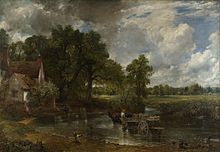 The Hay Wain by John Constable is considered an archetypal English painting
The Hay Wain by John Constable is considered an archetypal English painting Main article: English art
Main article: English artEnglish art was dominated by imported artists throughout much of the Renaissance, but in the 18th century a native tradition became much admired. It is often considered to be typified by landscape painting, such as the work of J.M.W. Turner and John Constable. Portraitists like Thomas Gainsborough, Joshua Reynolds and William Hogarth are also significant. Hogarth also developed a distinctive style of satirical painting.
Cuisine
Main article: English cuisineSince the early modern era, the food of England has historically been characterised by its simplicity of approach, honesty of flavour, and a reliance on the high quality of natural produce. This has resulted in a traditional cuisine which tended to veer from strong flavours, such as garlic, and an avoidance of complex sauces which were commonly associated with Catholic Continental political affiliations[1] Traditional meals have ancient origins, such as bread and cheese, roasted and stewed meats, meat and game pies, and freshwater and saltwater fish. The 14th century English cookbook, the Forme of Cury, contains recipes for these, and dates from the royal court of Richard II.
Modern English cuisine is difficult to differentiate from British cuisine as a whole. However, there are some forms of cuisine considered distinctively English. The full English breakfast is a variant of the traditional British fried breakfast. The normal ingredients of a traditional full English breakfast are bacon, eggs, fried or grilled tomatoes, fried mushrooms, fried bread or toast, and sausages, usually served with a mug of tea. Black pudding is added in some regions as well as fried leftover mashed potatoes called Potato cakes.
Tea and beer are typical and rather iconic drinks in England, particularly the former. Cider is produced in the West Country and, more recently, East Anglia, and the south of England has seen the reintroduction of vineyards producing high quality white wine on a comparatively small scale.
Roast beef is a food traditionally associated with the English; the link was made famous by Henry Fielding's patriotic ballad "The Roast Beef of Old England", and William Hogarth's painting of the same name. Indeed, since the 1700s the phrase "les rosbifs" has been a popular French nickname for the English.[2]
England produces hundreds of regional cheeses, including:
- Cheddar cheese
- Stilton cheese
- Wensleydale cheese
- Lancashire cheese
- Dorset Blue Vinney cheese
- Cheshire cheese
- Double Gloucester cheese
- Red Leicester
- Blue cheese
More dishes invented in or distinctive to England include:
- The English crumpet is a form of crumpet; it is distinguished from its Scottish equivalent by its greater thickness
- Muffins, known as 'English muffins' in North America, are a form of rounded, yeast-leavened bread
- Lancashire hotpot
- Mushy peas
- Worcester sauce
- Clotted cream from Devon and Cornwall
- Yorkshire pudding
- Sausage and mash
- Eccles cake
- Cumberland sausage
- Lincolnshire sausage
- Balti, a form of curry invented in Birmingham
- Apple pie
- Banoffee pie
- Chicken tikka masala
Folklore
Main article: English folkloreEnglish folklore is the folk tradition that has evolved in England over the centuries. England abounds with folklore, in all forms, from such obvious manifestations as semi-historical Robin Hood tales, to contemporary urban myths and facets of cryptozoology such as the Beast of Bodmin Moor. The famous Arthurian legends may not have originated in England, but variants of these tales are associated with locations in England, such as Glastonbury and Tintagel.
Examples of surviving English folk traditions include the Morris dance and related practices such as the Abbots Bromley Horn Dance and the Mummers Plays. In many, usually rural places, people still gather for May Day festivals on the first of May to celebrate the beginning of summer. This traditionally involves local children skipping around a maypole - a large pole erected on the village green (historically a tree would have been specially cut down) - each carrying a coloured ribbon, resulting in a multi-coloured plaited pattern. The festival traditionally features Morris dancing and various festivities, culminating in the crowning of a 'May Queen'. Many regional variations of the festivals exist; the oldest still practised today is the "'Obby 'Oss festival of Padstow, which dates back to the 14th century.
The utopian vision of a traditional England is sometimes referred to as Merry England.
Law
Main article: English law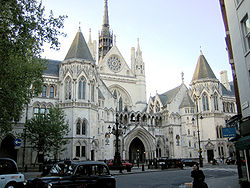 The Royal Courts of Justice on the Strand, London is the seat of the High Court of Justice and the Court of Appeal.
The Royal Courts of Justice on the Strand, London is the seat of the High Court of Justice and the Court of Appeal.
English law is the legal system of England and Wales.[2] Due to the British Empire, it has been exported across the world: it is the basis of common law[3] jurisprudence of most Commonwealth countries, and English law prior to the American revolution is still part of the law of the United States, except in Louisiana, and provides the basis for many American legal traditions and policies, though it has no superseding jurisdiction.
Literature
 William Hogarth's depiction of a scene from Shakespeare's The Tempest is an example of how English literature influenced English painting in the 18th century
William Hogarth's depiction of a scene from Shakespeare's The Tempest is an example of how English literature influenced English painting in the 18th century Main article: English literature
Main article: English literatureEnglish literature begins with Anglo-Saxon literature, which was written in Old English. For many years, Latin and French were the preferred literary languages of England, but in the medieval period there was a flourishing of literature in Middle English; Geoffrey Chaucer is the most famous writer of this period. The Elizabethan era is sometimes described as the golden age of English literature, as numerous great poets were writing in English, and the Elizabethan theatre produced William Shakespeare, often considered the English national poet.
Due to the expansion of English into a world language during the British Empire, literature is now written in English across the world. Writers often associated with England or for expressing Englishness include Shakespeare (who produced two tetralogies of history plays about the English kings), Jane Austen, Arnold Bennett, and Rupert Brooke (whose poem "Grantchester" is often considered quintessentially English). Other writers are associated with specific regions of England; these include Charles Dickens (London), Thomas Hardy (Wessex), A. E. Housman (Shropshire), and the Lake Poets (the Lake District). In the lighter vein, Agatha Christie's mystery novels are outsold only by Shakespeare and The Bible.
Music
Main articles: Folk music of England and Music of the United KingdomEngland has a long and rich musical history. The United Kingdom has, like most European countries, undergone a roots revival in the last half of the 20th century. English music has been an instrumental and leading part of this phenomenon, which peaked at the end of the 1960s and into the 1970s.
The achievements of the Anglican choral tradition following on from 16th century composers such as Thomas Tallis, John Taverner and William Byrd have tended to overshadow instrumental composition. The semi-operatic innovations of Henry Purcell did not lead to a native operatic tradition, but George Frederick Handel found important royal patrons and enthusiastic public support in England. The rapturous receptions afforded by audiences to visiting musical celebrities such as Haydn often contrasted with the lack of recognition for home-grown talent. However, the emergence of figures such as Edward Elgar and Arthur Sullivan in the 19th century showed a new vitality in English music. In the 20th century, Benjamin Britten and Michael Tippett emerged as internationally-recognised opera composers, and Ralph Vaughan Williams and others collected English folk tunes and adapted them to the concert hall. Cecil Sharp was a leading figure in the English folk revival.
Finally, a new trend emerged out of Liverpool in 1962. The Beatles became the most popular musicians of their time, and in the composing duo of John Lennon and Paul McCartney, popularized the concept of the self-contained music act. Before the Beatles, very few popular singers composed the tunes they performed. The "Fab Four" opened the doors for other English acts such as The Rolling Stones, Cream, The Hollies, The Kinks, The Beatles, The Who, Queen, Led Zeppelin, Black Sabbath, Genesis, Iron Maiden and Pink Floyd to the globe.
Some of England's leading contemporary artists include Eric Clapton, Elton John, George Michael, Blur, The Spice Girls, Bloc Party, Arctic Monkeys, Robbie Williams, Oasis, The Smiths, Radiohead, David Bowie, Coldplay, Muse and Mumford and Sons.
Philosophy
Main page: :Category:English philosophersEnglish philosophers include Francis Bacon, Sir Thomas More, John Locke, Thomas Hobbes, Thomas Paine, Jeremy Bentham, John Stuart Mill and Bertrand Russell.
Religion
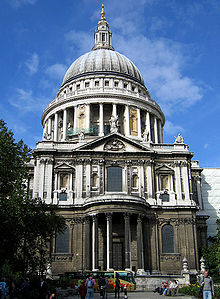 St Paul's Cathedral, seat of the Anglican Bishop of London.
St Paul's Cathedral, seat of the Anglican Bishop of London. Further information: Religion in England
Further information: Religion in EnglandIn the 2001 Census, a little over 37 million people in England and Wales professed themselves to be Christian. Since the English Reformation of the 16th century, when England became independent from Rome, English Christians have predominantly been members of the Church of England (a branch of the Anglican Communion), a form of Christianity that is both reformed and Catholic. The Book of Common Prayer is the foundational prayer book of the Church of England, replacing the various Latin rites of the Roman Catholic Church, and the Church of England functions as the established church in England. Both the Church of England and the Catholic Church in England and Wales trace their formal history from the 597 Augustinian mission to the English. Today, most English people practising organised religion are, at least nominally, affiliated to the Church of England. Other significant Christian denominations are Roman Catholicism and Methodism (itself originally a movement within the Anglican Church). Churches that originated in England include the Methodist church, the Quakers and the Salvation Army.
Jewish immigration since the 17th century means that there is an integrated Jewish English population, mainly in urban areas. 252,000 Jews were recorded in England & Wales in the 2001 Census; however this represents a decline of about 50% over the previous 50 years, caused by emigration and intermarriage.[citation needed] Immigration to Britain from India and Pakistan since the 1950s means that a large number of people living in England practise Islam (818,000), Hinduism (467,000), or Sikhism (301,000); however, the census shows that adherents to these religions are more likely to regard themselves as British rather than English.[4] The 2001 census also revealed that about seven million people, or 15% of English people, claim no religion.[5]
Language
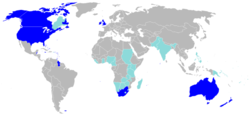 Countries where English has official status or is widely spoken.
Countries where English has official status or is widely spoken.
English people traditionally speak the English language, a member of the West Germanic language family. The modern English language evolved from Old English, with lexical influence from Norman-French, Latin, and Old Norse. Cornish, a Celtic language originating in Cornwall, is currently spoken by about 3,500 people. Historically, another Brythonic Celtic language, Cumbric, was spoken in Cumbria in North West England, but it died out in the 11th century although traces of it can still be found in the Cumbrian dialect. Because of the 19th century geopolitical dominance of the British Empire and the post-World War II hegemony of the United States, English has become the international language of business, science, communications, aviation, and diplomacy.
Science
The English have played a significant role in the development of the sciences. Prominent individuals have included Isaac Newton, Francis Crick, Abraham Darby, Michael Faraday, Charles Darwin, Joseph Swan, Frank Whittle and Stephen Hawking.
Surnames
Rank Surname Origin Percentage[6] 1 Smith England 1.26 2 Jones England and Wales 0.75 3 Taylor England 0.59 4 Brown England and Scotland 0.56 5 Williams England and Wales 0.39 6 Wilson Scotland 0.39 7 Johnson England 0.37 8 Davis Wales 0.34 9 Robinson England 0.32 10 Wright England 0.32 11 Thompson England 0.31 12 Evans Wales 0.30 13 Walker England 0.30 14 White England 0.30 15 Roberts England 0.28 16 Green England 0.28 17 Hall England 0.28 18 Wood England 0.27 19 Jackson England 0.27 20 Clarke England 0.26 Sport and leisure
See also: Sport in EnglandThere are many sports which have been codified by the English, and then spread worldwide, including badminton, cricket, croquet, football, field hockey, lawn tennis, rugby league, rugby union, table tennis and thoroughbred horse racing. In the late 18th century, the English game of rounders was transported to the American Colonies, where it evolved into baseball. Association football, cricket, rugby union and rugby league are considered to be the national sports of England.
England, and the other countries of the United Kingdom, compete as a separate nations in some international sporting events, especially in football, cricket and rugby union. The England cricket team actually represents England and Wales.[7] However, in the Olympic Games, England competes as part of the Great Britain team. Supporters are nowadays more likely to carry the Cross of Saint George flag whereas twenty years ago the British Union Flag would have been the more prominent. In an article in the Daily Mirror on 17 September 2005, Billy Bragg said "Watching the crowd in Trafalgar Square celebrating The Ashes win, I couldn't help but be amazed at how quickly the flag of St. George has replaced the Union Flag in the affections of England fans. A generation ago, England games looked a lot like Last Night of the Proms, with the red, white and blue firmly to the fore. Now, it seems, the English have begun to remember who they are.".[8]
Football maintains a consistent popularity across the country and is often indicative of trends across wider culture in England, such as in clothing and music. The increase in hooliganism amongst football fans in the 1970s and 1980s can in part be attributed to a parallel rise in unemployment. As England, and the United Kingdom as a whole, returned to a more affluent and stable financial position in the late 1990s, violent football culture was transformed into a culture where families were welcome, and nationalism lost its aggressive edge.
Different sports directly represent the different social classes within England. Rugby league, for instance, was traditionally associated with the old mill towns of north-west England, whereas cricket and rugby union have their origins in the private schools of the 18th and 19th centuries respectively.
However, since the English Rugby World Cup victory in 2003, the sport has seen a revival in widespread popularity across the class system. Likewise, after the Ashes victory of 2005, cricket has regained much of the popularity it had lost throughout the 1990s.
Tennis is also one of England's major sports. One of the most prestigious tournaments in tennis, Wimbledon, is held in England.
Symbols
The English flag is a red cross on a white background, commonly called the Cross of Saint George. It was adopted after the Crusades. Saint George, later famed as a dragon-slayer, is also the patron saint of England. The three golden lions on a red background was the banner of the kings of England derived from their status as Duke of Normandy and is now used to represent the English national football team and the English national cricket team, though in blue rather than gold. The English oak and the Tudor rose are also English symbols, the latter of which is (although more modernised) used by the England national rugby union team.
St George's Day in England is marked as the day of the patron saint, and is also celebrated as the day of birth and death of William Shakespeare.
England has no official anthem; however, the United Kingdom's "God Save the Queen" is currently used. Other songs are sometimes used, including "Land of Hope and Glory" (used as England's anthem in the Commonwealth Games), "Jerusalem", "Rule Britannia", and "I Vow to Thee, My Country". Moves by certain groups are encouraging adoption of an official English anthem following similar occurrences in Scotland and Wales.[9][10]
See also
References
- ^ P.474,Society and Religion in Elizabethan England, Richard L. Greaves ISBN 978-0816610303 here [1]
- ^ Jurisdiction Of Courts In England And Wales And Their Recognition Of Foreign Insolvency Proceedings
- ^ http://dictionary.law.com/definition2.asp?selected=248
- ^ Ethnicity and Identity: Religion, National Statistics, 21 March 2005.; Identity, National Statistics, 21 March 2005.
- ^ "2001 National Census". National Statistics. 2001. pp. England , Ethnicity and Religion. http://www.statistics.gov.uk/census2001/profiles/64.asp. Retrieved 2007-08-05.
- ^ http://www.ucl.ac.uk/paediatric-epidemiology/pdfs/Signficance_Surnames_Paper.pdf University College London, Paediatric-Epidemiology Significance Surnames Paper
- ^ "England Cricket Team Profile". http://www.travour.com/icc-cricket-world-cup-2007-west-indies/cricket-world-cup-teams/england-cricket-team-profile.html. Retrieved 2006-09-13.
- ^ "The Saturday Soap Box: We have to make Jerusalem England's national anthem". Daily Mirror. 2005-09-17. Archived from the original on 2006-10-11. http://web.archive.org/web/20061011022931/http://www.billybragg.co.uk/words/words1.php?word_id=34. Retrieved 2006-11-01.
- ^ Anthem 4 England - English National Anthem
- ^ Anthem for England
External links
Culture of Europe Sovereign
states- Albania
- Andorra
- Armenia
- Austria
- Azerbaijan
- Belarus
- Belgium
- Bosnia and Herzegovina
- Bulgaria
- Croatia
- Cyprus
- Czech Republic
- Denmark
- Estonia
- Finland
- France
- Georgia
- Germany
- Greece
- Hungary
- Iceland
- Ireland
- Italy
- Kazakhstan
- Latvia
- Liechtenstein
- Lithuania
- Luxembourg
- Macedonia
- Malta
- Moldova
- Monaco
- Montenegro
- Netherlands
- Norway
- Poland
- Portugal
- Romania
- Russia
- San Marino
- Serbia
- Slovakia
- Slovenia
- Spain
- Sweden
- Switzerland
- Turkey
- Ukraine
- United Kingdom
- (England
- Northern Ireland
- Scotland
- Wales)
- Vatican City
States with limited
recognition- Abkhazia
- Kosovo
- Nagorno-Karabakh
- Northern Cyprus
- South Ossetia
- Transnistria
Dependencies
and other territories- Åland
- Faroe Islands
- Gibraltar
- Guernsey
- Jan Mayen
- Jersey
- Isle of Man
- Svalbard
Other entities - European Union
Categories:- English culture
Wikimedia Foundation. 2010.

